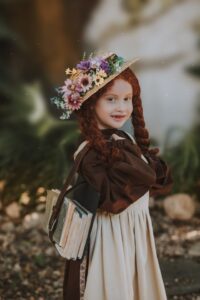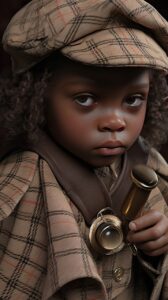World Book Day is a significant event celebrated around the globe that encourages people of all ages to delve into the magical world of literature. It serves as a reminder of the importance of reading and promotes a love for books. One of the highlights of World Book Day is the opportunity to dress up as iconic literary characters. This article will delve into the history and significance of World Book Day, explore the impact of literary characters on society, provide costume ideas inspired by iconic literary characters, and offer tips for creating your own literary character costume. Join us as we embark on an exciting journey into the world of literature and costume inspiration.
Understanding the Importance of World Book Day
 World Book Day, celebrated on April 23rd each year, is a celebration of books, authors, and reading. It is a day to rekindle the love for literature and to encourage people of all ages to explore the wonders of the written word. This global event fosters a sense of community among book lovers and opens doors to new literary experiences.
World Book Day, celebrated on April 23rd each year, is a celebration of books, authors, and reading. It is a day to rekindle the love for literature and to encourage people of all ages to explore the wonders of the written word. This global event fosters a sense of community among book lovers and opens doors to new literary experiences.
On this special day, libraries, schools, and bookstores around the world come alive with various activities and events. From book fairs and storytelling sessions to author talks and book signings, World Book Day offers a plethora of opportunities for individuals to engage with literature in unique and exciting ways.
One of the key aspects that makes World Book Day so significant is its ability to promote literacy and education. By emphasizing the importance of reading, this event aims to improve literacy rates and encourage lifelong learning. It serves as a reminder that books have the power to transform lives, broaden horizons, and inspire individuals to reach their full potential.
The History of World Book Day
World Book Day has its roots in Catalonia, Spain, where it was first celebrated on April 23rd, 1923, in honor of Miguel de Cervantes, William Shakespeare, and the Inca Garcilaso de la Vega, all of whom passed away on that date. The United Nations Educational, Scientific and Cultural Organization (UNESCO) declared April 23rd as the International Day of the Book, which eventually led to the establishment of World Book Day.
Since its inception, World Book Day has gained international recognition and has become a platform for promoting cultural diversity, multilingualism, and the protection of intellectual property. It serves as a reminder of the rich literary heritage that exists across different cultures and languages, and encourages individuals to explore and appreciate the works of authors from around the world.
Each year, World Book Day is celebrated with a specific theme, highlighting different aspects of literature and reading. These themes range from promoting indigenous literature and fostering gender equality in literature to encouraging environmental awareness through books. By focusing on these themes, World Book Day aims to create a deeper understanding of the role that books play in shaping society and addressing global issues.
The Significance of Dressing Up on World Book Day
 Dressing up as beloved literary characters adds an element of excitement to World Book Day celebrations. It allows individuals to immerse themselves in their favorite stories and becomes a visual representation of their passion for reading. Moreover, dressing up sparks creativity, ignites imagination, and encourages conversation among participants, fostering an engaging atmosphere centered around the magic of literature.
Dressing up as beloved literary characters adds an element of excitement to World Book Day celebrations. It allows individuals to immerse themselves in their favorite stories and becomes a visual representation of their passion for reading. Moreover, dressing up sparks creativity, ignites imagination, and encourages conversation among participants, fostering an engaging atmosphere centered around the magic of literature.
When people dress up as characters from books, it not only showcases their love for literature but also serves as a form of self-expression. It allows individuals to step into the shoes of their favorite characters, embody their traits, and experience the world through their eyes. This act of transformation can be empowering and liberating, as it breaks down barriers and encourages individuals to embrace their imagination.
Furthermore, dressing up on World Book Day provides an opportunity for individuals to discover new books and authors. Seeing others dressed as characters from lesser-known works can pique curiosity and inspire individuals to explore new literary realms. It promotes a sense of inclusivity, as people from different backgrounds and age groups come together to celebrate their shared love for books.
World Book Day is not just a celebration of books; it is a celebration of the power of words and the impact they have on individuals and societies. It serves as a reminder of the importance of reading and encourages people to embrace the magic of literature. So, whether you choose to dress up as your favorite character or simply curl up with a good book, World Book Day offers a chance to embark on a literary adventure that will stay with you long after the day is over.
Exploring Iconic Literary Characters
Literary characters have the power to captivate readers and leave a lasting impact on society. They embody traits, values, and experiences that resonate with readers across generations. Let’s delve into the influence and timelessness of classic literary characters.
The Impact of Literary Characters on Society
 Characters like Sherlock Holmes, Hamlet, Jane Eyre, and Jay Gatsby have become cultural icons, often embodying larger social themes. They have the ability to challenge societal norms, inspire change, and provide readers with a sense of escapism. These characters serve as a reflection of human nature, allowing readers to connect with their emotions, struggles, and aspirations.
Characters like Sherlock Holmes, Hamlet, Jane Eyre, and Jay Gatsby have become cultural icons, often embodying larger social themes. They have the ability to challenge societal norms, inspire change, and provide readers with a sense of escapism. These characters serve as a reflection of human nature, allowing readers to connect with their emotions, struggles, and aspirations.
For example, Sherlock Holmes, the brilliant detective created by Sir Arthur Conan Doyle, has had a profound impact on the genre of mystery and crime fiction. With his sharp intellect, keen observation skills, and deductive reasoning, Holmes has become the archetype of the detective figure. His influence can be seen in countless detective stories, films, and television series that have followed in his footsteps.
Similarly, Hamlet, the tragic hero of William Shakespeare’s play, has left an indelible mark on literature and theater. Hamlet’s internal struggle, his contemplation of life’s meaning, and his famous soliloquies have made him a symbol of existential angst. His character has been analyzed and interpreted by scholars and actors for centuries, exploring themes of revenge, madness, and the complexity of human nature.
Jane Eyre, the protagonist of Charlotte Brontë’s novel, is a character who defied societal expectations for women in the Victorian era. With her strong-willed nature, intelligence, and desire for independence, Jane Eyre challenged the traditional role of women as passive and submissive. Her story continues to inspire readers, particularly women, to pursue their own ambitions and assert their individuality.
Lastly, Jay Gatsby, the enigmatic millionaire from F. Scott Fitzgerald’s novel, “The Great Gatsby,” represents the American Dream and the pursuit of wealth and social status. Gatsby’s tragic story serves as a cautionary tale about the emptiness of materialism and the illusion of the American Dream. His character resonates with readers, reminding them of the dangers of unchecked ambition and the importance of genuine human connections.
The Timelessness of Classic Literary Characters
Classic literary characters stand the test of time, transcending the era in which they were created. Characters like Romeo and Juliet, Elizabeth Bennet, and Captain Ahab continue to resonate with readers today, reaffirming the power of storytelling. These characters remain relevant because of the universal themes they explore, such as love, ambition, and the human condition.
Romeo and Juliet, the star-crossed lovers from William Shakespeare’s tragedy, have become synonymous with passionate and forbidden love. Their story of young love torn apart by feuding families has been adapted into numerous plays, films, and even modern retellings. The themes of love, fate, and the destructive power of hatred continue to captivate audiences, reminding them of the enduring power of love and the consequences of unchecked prejudice.
Elizabeth Bennet, the spirited heroine of Jane Austen’s novel, “Pride and Prejudice,” challenges societal expectations of women in the early 19th century. With her wit, intelligence, and refusal to conform to societal norms, Elizabeth Bennet has become an iconic character in literature. Her journey of self-discovery and her refusal to settle for a loveless marriage continue to inspire readers, particularly women, to prioritize their own happiness and independence.
Captain Ahab, the obsessed captain in Herman Melville’s novel, “Moby-Dick,” represents the destructive power of obsession and the human desire for revenge. Ahab’s relentless pursuit of the white whale, Moby Dick, serves as a cautionary tale about the dangers of unchecked ambition and the consequences of harboring grudges. His character continues to resonate with readers, reminding them of the importance of balance and the perils of allowing one’s obsessions to consume them.
Classic literary characters have a profound impact on society and stand the test of time due to their ability to embody larger social themes and explore universal human experiences. Whether they challenge societal norms, inspire change, or provide readers with a sense of escapism, these characters continue to captivate readers across generations, reminding us of the power of storytelling and the enduring relevance of literature.
Costume Ideas Inspired by Iconic Literary Characters
Now that we understand the significance of literary characters, let’s delve into some costume ideas that pay homage to them. Whether you’re an ardent fan of classic novels or prefer contemporary literature, there’s a literary character costume waiting to be brought to life.
Creating a Costume from Classic Novels
Classic novels offer a treasure trove of iconic characters to draw inspiration from. Whether you choose to don the attire of the sophisticated Jay Gatsby, the enigmatic Mr. Darcy, or the adventurous Alice from Wonderland, there is no shortage of options. Dive into the pages of your favorite classics and let your imagination run wild.
Modern Literary Characters for Costume Inspiration
Contemporary literature also presents an array of vibrant and memorable characters to draw inspiration from. You can become the witty and resourceful Hermione Granger from the Harry Potter series, the daring Katniss Everdeen from The Hunger Games, or the mysterious Lisbeth Salander from The Girl with the Dragon Tattoo. These modern-day heroines and heroes allow for a unique and contemporary twist to your literary character costume.
Tips for Creating Your Literary Character Costume
Creating your own literary character costume can be a fun and rewarding experience. Here are some tips and tricks to help you bring your beloved character to life:
DIY Costume Tips and Tricks
Embrace your creative side by opting for a DIY costume. Research your character carefully, paying attention to their distinctive features and clothing style. Utilize thrift stores, your own wardrobe, and basic sewing skills to create an authentic and cost-effective costume. Don’t forget to add signature props or accessories to complete the look!
Incorporating Literary Elements into Your Costume
To truly capture the essence of your chosen character, consider incorporating elements from their literary world into your costume. For instance, if you’re dressing up as Sherlock Holmes, carry a magnifying glass or wear a deerstalker hat. These small details can make all the difference and enhance the overall impact of your costume.
Making World Book Day a Learning Experience
While dressing up on World Book Day is undoubtedly enjoyable, it is essential to recognize the educational benefits that this celebration offers.
The Educational Benefits of Dressing as a Literary Character
By dressing up as a favorite literary character, individuals have the opportunity to delve deeper into the author’s intent, the story’s themes, and the character’s role within the narrative. This exploration fosters a deeper appreciation for literature, encouraging readers to analyze and interpret the text in a meaningful way.
Encouraging Reading Through World Book Day Activities
In addition to dressing up, World Book Day activities often include book fairs, storytelling sessions, and author visits. These activities promote the pleasure of reading and motivate individuals to explore new books and authors. World Book Day is not just about dressing up as beloved characters; it is about creating a love for reading that extends far beyond the event itself.
World Book Day provides a unique opportunity to celebrate literature, ignite imagination, and indulge in the transformative power of storytelling. Whether you choose to become a classic literary character or embrace a modern-day hero, let your costume inspire others to embark on their own literary adventures. Let’s make every day a book day!









